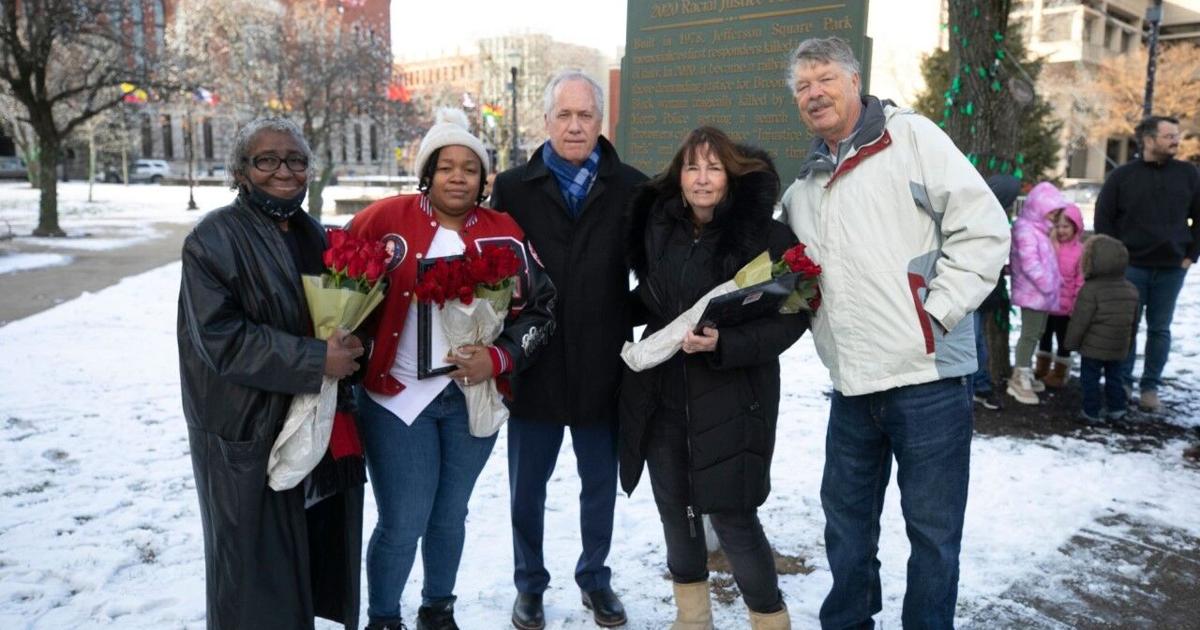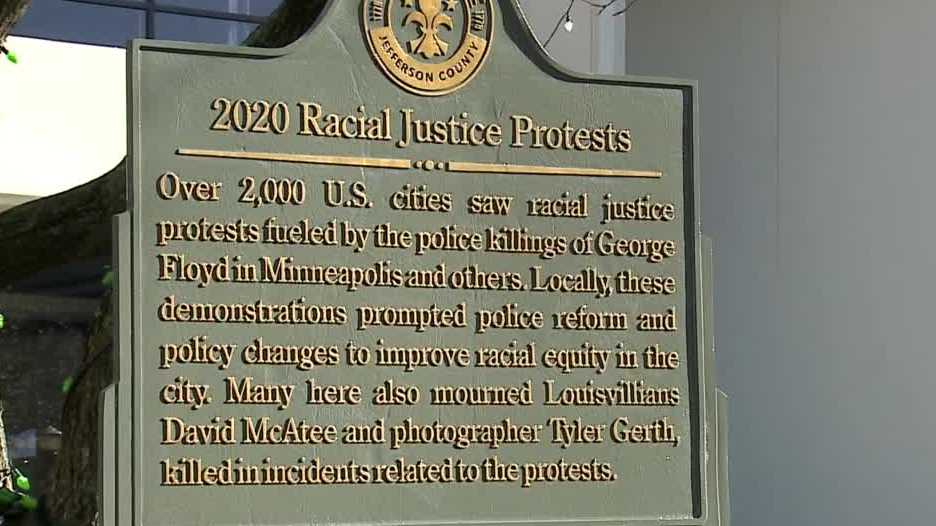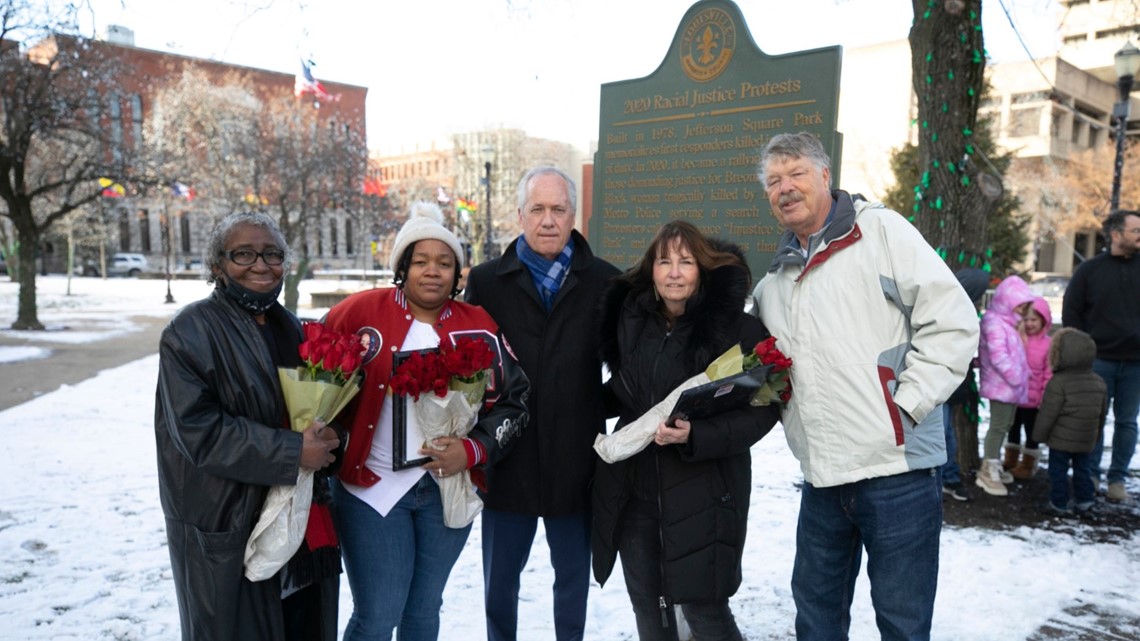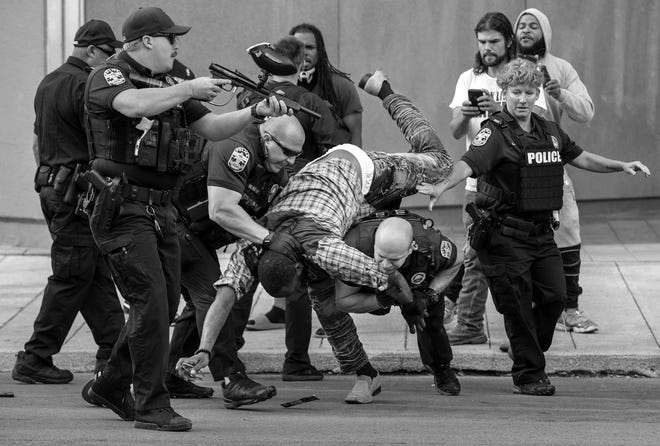Greg Fischer shows some of the signs — both visible and invisible to the eye — of a political leader who has spent over a decade in office as Louisville's mayor.There are a few more gray hairs, some additional wrinkles and countless valuable and tough experiences lived through after winning election in 2010 and preparing to leave office now as 2022 ends.But sitting down with The Courier Journal for an interview inside Metro Hall on Monday morning, Fischer, 64, said he had no second thoughts about serving for three terms. And the Democrat offered introspection on his time in office, his achievements and on Louisville's future.Here's what Fischer said, with some responses edited for length and clarity.How do you describe your third and final term, and would you describe it as the most challenging of the three?"Well, it was definitely the most challenging term. I mean, when you think about the fact that we're in a once-in-a-century global pandemic and then twice-a-century racial justice protests happening at the same time, and I was president of the U.S. Conference of Mayors also in (President Donald) Trump's last six months in office, and he was really coming after cities, so kind of defending the mayors of America during all that was a really difficult time. I'm glad our administration was in office at that point in time, because it requires a lot of experience to navigate a city through something like that. They were unprecedented challenges, and I think now that it's gone by, it was super intense obviously while we were in it, the loss of the lives of Breonna Taylor and Tyler Gerth and David McAtee were horrible, but what we showed as a city was we can get through something very difficult."There were four cities that were really in the hot spot then. It was Minneapolis, Seattle and Portland and Louisville. We've emerged much stronger and quicker than any of those cities have, so I'm really proud of our city, and I'm proud of the way protesters have gotten involved with the administration and on boards to help us move toward process improvement and not just protest as well. And the police learned during all that process too how to deescalate. You know, we've never been through anything like that as a city before, so we were all learning together, and I think history will show we did a commendable job with something that was very, very challenging."Timeline:Notable events during Greg Fischer's tenure as Louisville mayor: A timelineDid family or friends try to dissuade you from running again for a third term, or was there any point during the past two years when things were getting really chaotic that you had loved ones saying, "I wish you hadn't run again?""I mean a lot of people just said why would you go through all that grief and all that criticism because, you know, people were trying to exert a lot of pressure on that time to make quick decisions, and I knew that was not the right thing to do because these were very complicated issues that were going to take investigations to really understand what took place, and that was the only way that justice would be rendered, and so, to interfere with that in any way, I felt, was not the right thing to do. Our police officers deserve due process, and the community deserved the truth, and that doesn't come quickly. But we're living in a time obviously where people want things like this (snaps fingers) and they think they know what's going on and should be done, and obviously what people thought should have been done quickly in the heat of the moment would have been the wrong thing to do, and time has shown us that."We got things done in the third term that we couldn't have gotten done in the first eight years, in particular, the funding of the Evolve502 Scholarship, so I think that will be one of the things that will go down as one of our top five or top 10 accomplishments. ...The reason that's important is the main cause of problems that come into this office are due to poverty, and the number one disruptor of poverty is an education, either a degree or a credential, so now, nobody in the community can say, 'We can't afford to send our kids to college or get a credential.' That took 10, 11 years to get done. So that wouldn't have happened in the eight years, or the massive investments we've made in affordable housing in this term as well. So in retrospect, I'm really glad that we were in office for 12 years. It was tough in that time, but that shaped our city and certainly shaped our country as well.""That's something that everybody's got to recognize, that the whole country has been going through their own version of this. It's a tough time in America right now. ... We're not being bombed by Russia. We don't have a famine going on like Somalia, but Americans say they're unhappy, so I think it's time for some introspection about where we're at, what we have and how we can work together."Do you think your accomplishments were, at times, overshadowed by Breonna Taylor's death or the pandemic and all these sorts of challenges, and did it ever feel like, no matter what you did, it would draw criticism from residents?Fischer: "Oh, absolutely. I can remember vividly having two meetings back to back where one meeting, an irate group was saying, 'Our protesters are out of control. Our city will never recover from this, You need to crack down on the protesters.' And the next meeting would be a group of people saying, 'Our police officers are out of control. You need to defund the police.' That snapshot was what that whole period was like. You had strong feelings on both sides. My job, I felt like, was to get our city through that somehow, just keep following the truth and keep going down the path of accountability. That's just one small snapshot."For subscribers:From boutique hotels to a gaming venue, 4 downtown Louisville developments to watch in 2023"I knew all the local protesters, and they knew me, and we worked together before, so we could talk easily back and forth. It was some of the out-of-the-town groups that came in that made things particularly difficult, especially here in our state, it's legal to walk down Main Street with an assault rifle, so managing these weekend activities where you had scores of people, and you had to give them their dedicated space to exercise free speech, and they had to see each other, so you had two opposing views. We had white nationalists, Black nationalists, both with assault rifles, over 100 each, and they're looking at each other and somehow trying to keep that safe while there's dozens of other things going on as well. That's difficult, especially when you're in say, day 80 of the protests, and everybody's exhausted — protesters, police, our administration. And I'm very thankful in retrospect that there was just not more mayhem than what took place."So that was a time where we went into almost 100% reactive mode. To have a great mayor's office, you have to be really good at reacting to problems but then you've got to keep working your strategy. You have to have proactive skills ... scholarships, affordable housing, Bourbonism and all these other activities. ...The pandemic compared to the protests in that time was much easier to manage because there was one clear objective — beat the pandemic. Nobody disagreed with that. During the protests, we had all these different points of view, so no matter what it was, 50% of people were going to be behind it."How much responsibility do you take or feel for some of the violence in recent years, in terms of homicides reaching this record high number?"In July 2020, here and all over America, boom. Homicides started skyrocketing. So, why? Guns are everywhere. It's interesting to me when people talk about guns, they don't say why are there so many guns on the streets of America? The state legislature in my view has been totally irresponsible in allowing guns to be issued to practically anybody, including assault rifles. And then they want to be critical about gun violence while they're providing the guns. It's like an arsonist pretending to be a firefighter. There needs to be accountability at these levels of the provision of so many weapons, basically unfettered, on the streets of America. So that didn't help, and then of course you had all the other issues of 2020, with police officers pulling back after they saw what happened with the George Floyd incident. Then we had to monitor the protests that were going on, so that was here in Louisville and all over America. Now, fortunately, homicides are down about 15% this year, shootings are down about 33% but still way too high. We've made good progress, and we're investing in not just the law enforcement side but the prevention and intervention. That's the key going forward.""You just can't say, 'We need more police officers.' If that was effective, we'd already be in good shape. The police show up after the fact. It's before the fact when you've got to have intervention and prevention, family responsibility and the community taking their responsibility, saying when they see the shooter and know the shooter, they need to be able to report that and feel they can do that safely."This year, this increase we've had in domestic violence is unusual. It's about 15% of our homicides this year. Normally, it's around 5% or 7%. So you've got that, and then the other thing that's happened over the last five years in particular is the shootings that take place because of social media beefs. When I started as mayor, social media was you sharing pictures with your friends. Now it's just totally out of control, and so people start beefing on that, and because guns are everywhere, they solve that by shooting and oftentimes it leads to homicides. We know our gang situation much better than we did before. ...I just really hope the next administration continues with this kind of whole-of-city approach and whole-of-government approach to funding, investing and reducing homicides, because overall crime is down, but these 'headline crimes' are what's up."Do you think LMPD is in a better spot now versus when you took office?"Well, it's a totally different environment. One is all the guns that are on the streets ... and then 2020 was extraordinarily difficult, not just on our citizens but on LMPD as well. When you have this once-every-50-years kind of protest activity, the police forces of America really were not trained for these mass demonstrations and so it's a totally different skill that's required for them, and all of a sudden, they're going from riding their beats to being on a protest line, people spitting on them, throwing urine and feces on them, saying everything possible, and talking to our police officers, it was like, what happened? All of a sudden (they) were these villains because they represent an institution and so that led to quite a few police officers leaving the profession. We're down about 250, 300 from our authorized force right now. Fortunately, the trend is starting to go back up now, so I'm thankful for that, but it was really hard on them, so we're in a really different place is what I would say ... particularly here because of the high-profile killing of Breonna Taylor and the way we've responded to that."I said, let's do a top-to-bottom review of the police department. Hillard Heintze came up with a lot of great recommendations, noticed our assets, but some people think that shows we're weak. No, audits show we're strong, because every agency has some areas to improve, and what's bad is if you don't go and find out and audit what's wrong. It's a time of uncertainty obviously. The Department of Justice investigation is taking place right now. Fortunately, we're way ahead of where that's going with the Hillard Heintze review. And we know we're in the process of searching for a police chief, which the mayor-elect intends to do. That puts some uncertainty in the police force also."For subscribers:JCPS is going to revisit its reading instruction — but internal discord threatens changeWhen somebody punched you at Fourth Street Live, did any family or close friends come to you and say again, "I wish you would end this job or not have to put up with this at this point?""Not really. At that point, I'm 11 1/2 years into (being) mayor. The country has totally changed. It's like, nothing surprises me. Some guy walks out of nowhere and sucker punches you. It's like, 'OK. It's another day in the mayor's office.' Fortunately, I did not get hurt seriously, and I bounced right back up, so as I joked, I'm glad to see I can still take a punch at 64 years old, but it's really unfortunate. You see kidnapping plots on governors. You see school board meetings descending into mayhem. ... It's like, we've got to be real introspective as a country about where are we going and why are we going there. You've got to kind of pull it back together if we expect to leave a better country for our kids and our grandkids."What things do you regret or would try to do differently when you look back at the 12 years?"Well, the areas that have been most high profile in terms of challenges have been with the police department, to the corrections department to some degree, and I relied on audits and national accreditation to kind of say, OK, we're on the right track...(but) these accreditations are not going deep enough to really get down into the process issues. For instance, with LMPD, the search warrant process that ultimately was the weak link with the Breonna Taylor death. Do you go down to that level and understand that when multiple signs off are required, would that have prevented anything? We're never going to know.""I wish there were more robust accreditation processes out there. I wish I knew that at the time as well, and then, this is big city we have, 400 square miles. I've tried to be everywhere and balance it with the time I spent in the office on strategy development, and I am kind of known as the people's mayor because I'm everywhere, but I wish I could have been more places as well. I really get good energy off of interacting with our citizens."What do you hope your legacy is as mayor?"I hope what people see is the city has gone through an incredible renaissance in these 12 years and we've showed that we can experience a tragedy and get through that, and get through it much more quickly than anybody thought possible in terms of the economic and tourism rebound, which are now beyond where they were before then. I never want to discount the pain to the families of Breonna and Tyler and David McAtee. That's first and foremost. Unfortunately in life, when a tragedy happens, triumphs happen, and you're measured I think about how you can pull out of tragedy.""I really emphasize us being a more global city, because I think it's important our kids grow up in a city that looks like the world, because they're going to be global citizens, so (immigrants) have produced almost 35% of our population growth, and (that) makes us a much more interesting and entrepreneurial and culturally dynamic city as well."Does Louisville have a strong identity? What would you say it is?"Our emergence and recognition on the global scene is much higher than it was 12 years ago, and everything from Muhammad Ali's passing and our celebration of the The Champ, five-time international model city of compassion, Bourbonism, our place with wellness and aging and innovation ... we're seen as a much more dynamic and inclusive city, that makes me proud as well, because we've got to be a global city, and we're rapidly becoming one."More:Cameron: JCPS board broke open meetings law by barring unmasked man from public meetingDo you talk to former mayors, such as Mayor Jerry Abramson, whether that's for advice or simply catching up?Fischer: "My last meeting with Jerry was probably four months or so ago. We had a lunch, and I just wanted to pick his brain about transitions and how he thought about transitioning out of the mayor's office and any advice, because he went quickly into the lieutenant governor type of gig, so he had a different path going forward form what I'll have."With Craig Greenberg preparing to take office, what are your hopes or expectations for him?"I've known him a long time. He was a supporter of my campaigns, and he's a business person like I was, so we've had a great relationship over the years, and each one of our departments prepared a transition book so they can get up to speed very quickly on that, and of course, he and I have regular conversations as well. One of the important things is you got to know what you don't know because I call being a mayor the essential worker of American politics because it's so immediate, things are happening. So are you clear on what your strategy is? Do you know how can do what within an administration and how you can react while you keep the plan going? So it's a lot ... (and) fortunately we've got a great team, so hopefully he'll assess all his strengths and weaknesses and build on those in his own unique way."What's next for you?"I'm going to take a pause ... just to digest everything. I'm going on a retreat in the month of April just to reflect and write, and I'll be traveling here and there. I retired once at an early age, and I was not happy at all. I like being busy, and I like making a difference, and I was able to do that before with businesses, and I just thought it would be a wonderful way to serve, to see if you could use a city as a platform for human potential to flourish. That's our whole model and definition of compassion. So that will be the driver for the rest of my life, is to see where I can make a difference in scale to help people, so I'll be assessing that over the next six to 12 months or so."What is your family looking forward to in terms of having you around a bit more?"If you're all in as a mayor like I am ... it's a 16-, 18-hour-a-day job, so literally you schedule when you're going to see your granddaughters (Fischer has two grandkids along with four children), and if it's not on the schedule, it's not going to happen ... it's very restrictive in that sense, so to have a lot more time to hang out and just see them grow and share love with them, I'm looking forward to that."Reach Billy Kobin at [email protected]







